人教新目标(Go for it)版八年级上Unit 2 How often do you exercise Section B第4课时课件(共45张PPT)
文档属性
| 名称 | 人教新目标(Go for it)版八年级上Unit 2 How often do you exercise Section B第4课时课件(共45张PPT) | 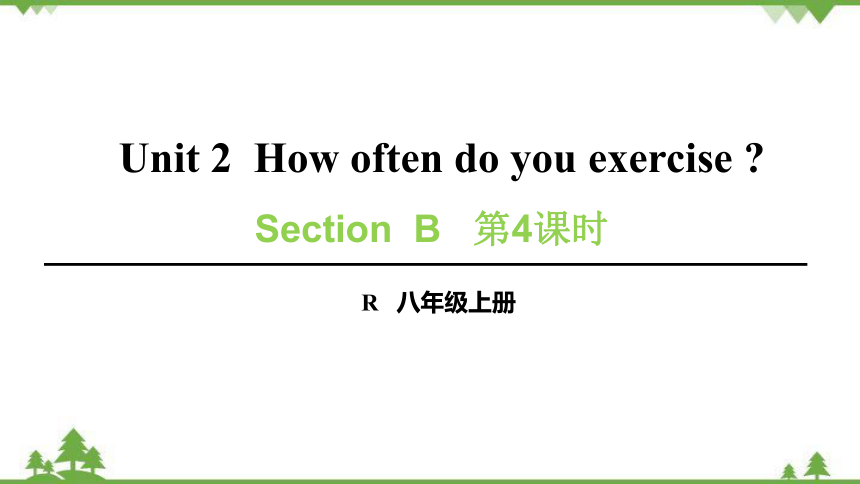 | |
| 格式 | ppt | ||
| 文件大小 | 27.8MB | ||
| 资源类型 | 教案 | ||
| 版本资源 | 人教新目标(Go for it)版 | ||
| 科目 | 英语 | ||
| 更新时间 | 2022-07-06 18:36:52 | ||
图片预览

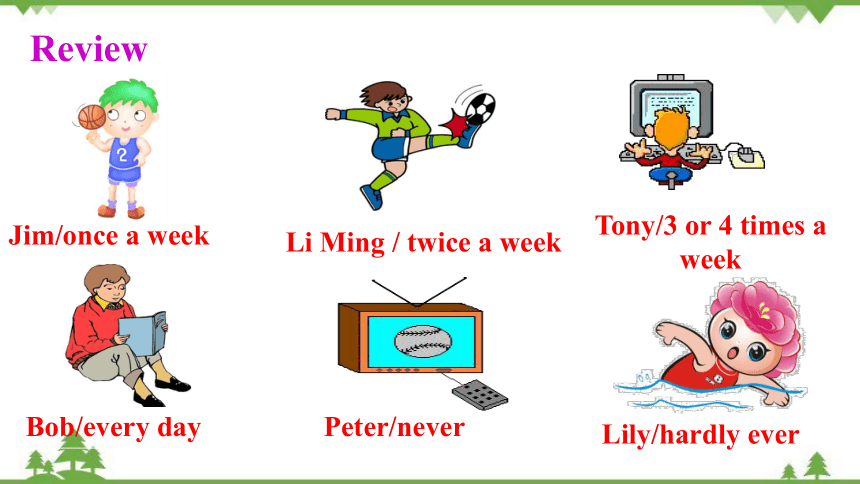
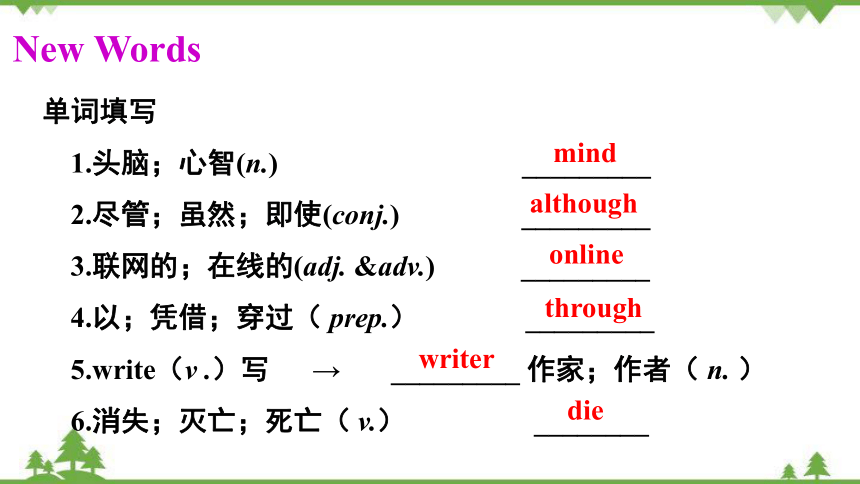
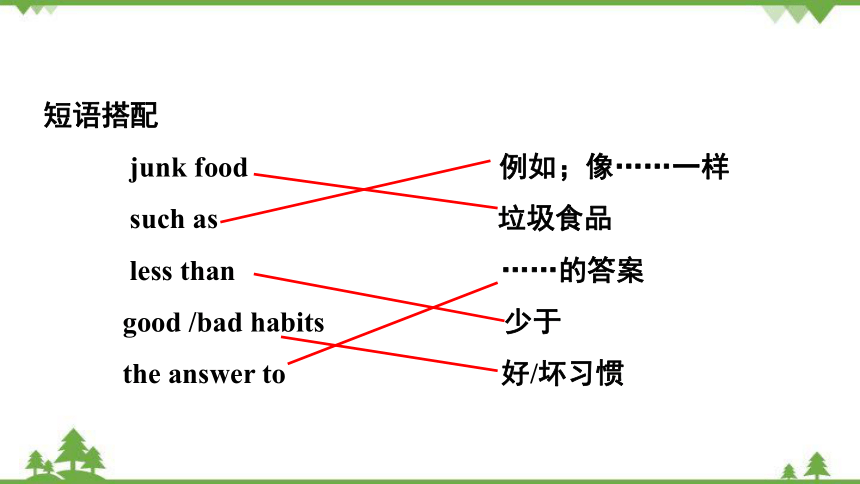

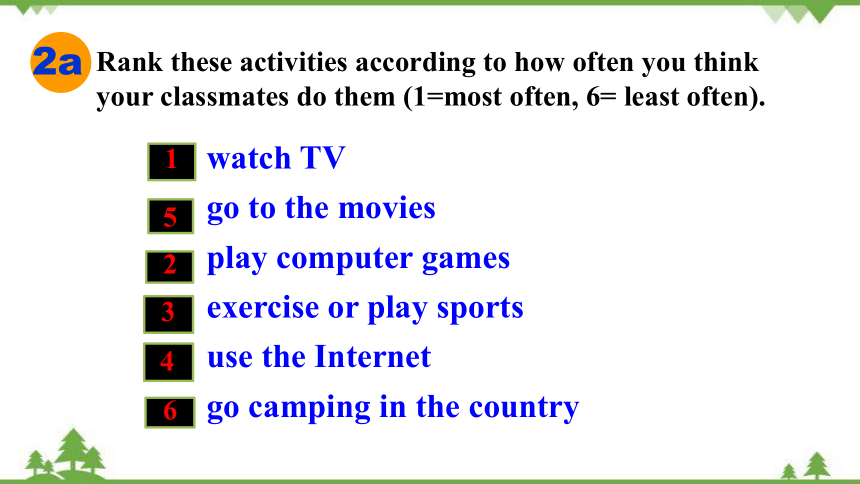
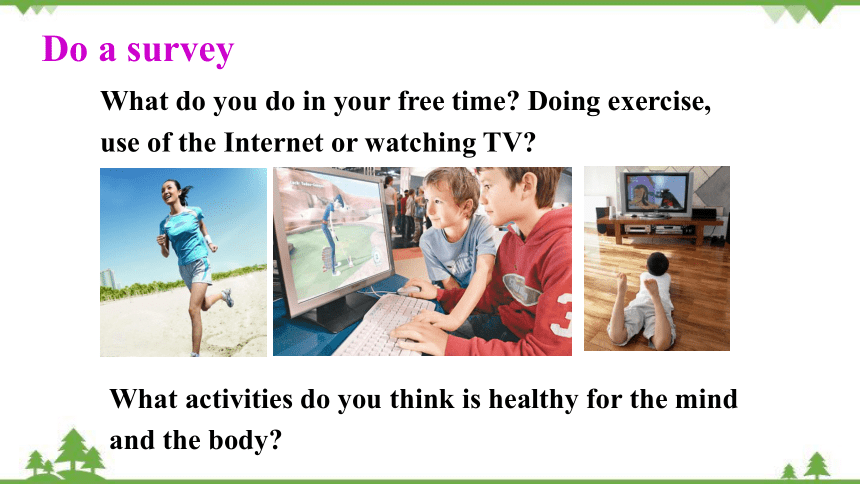
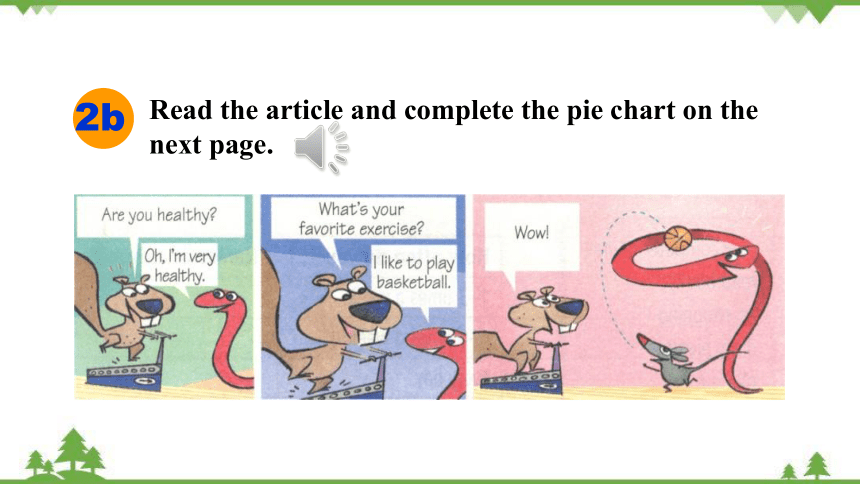
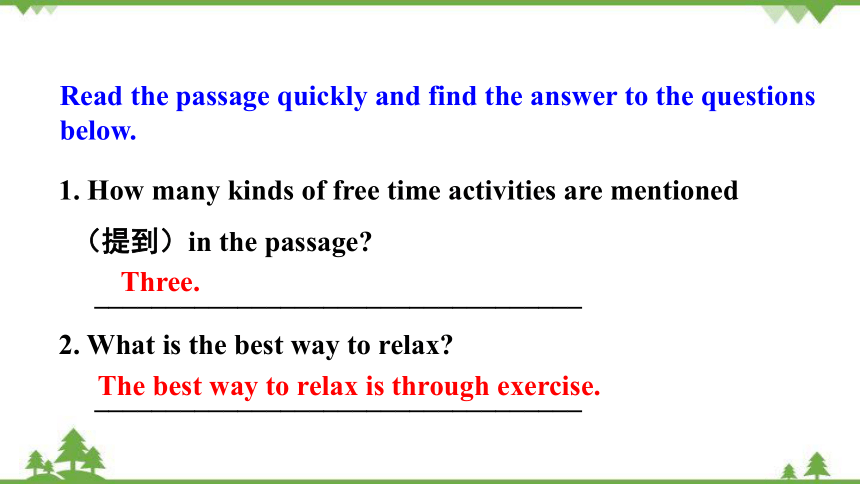
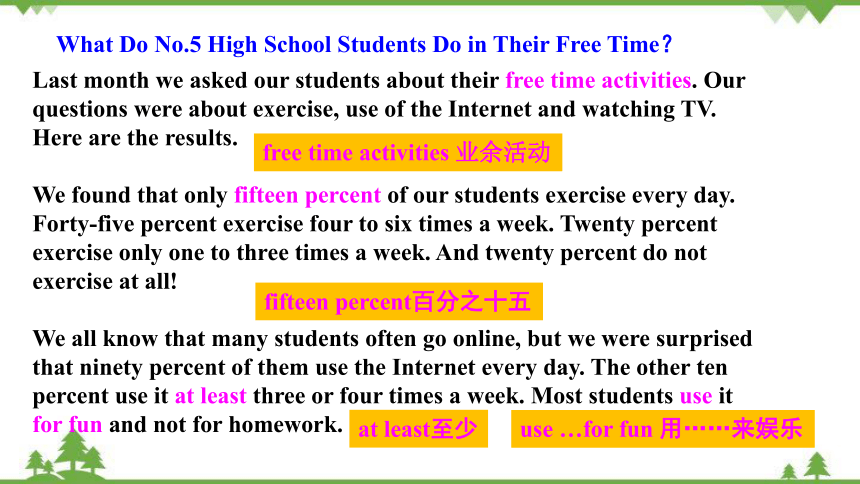
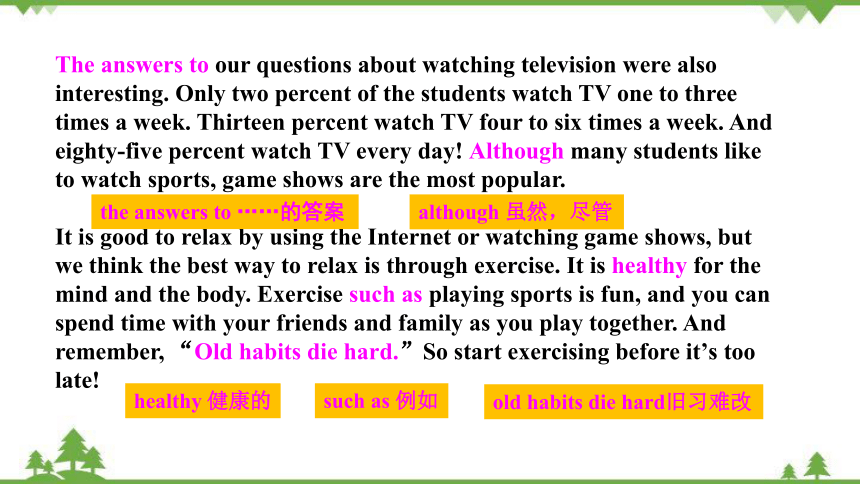
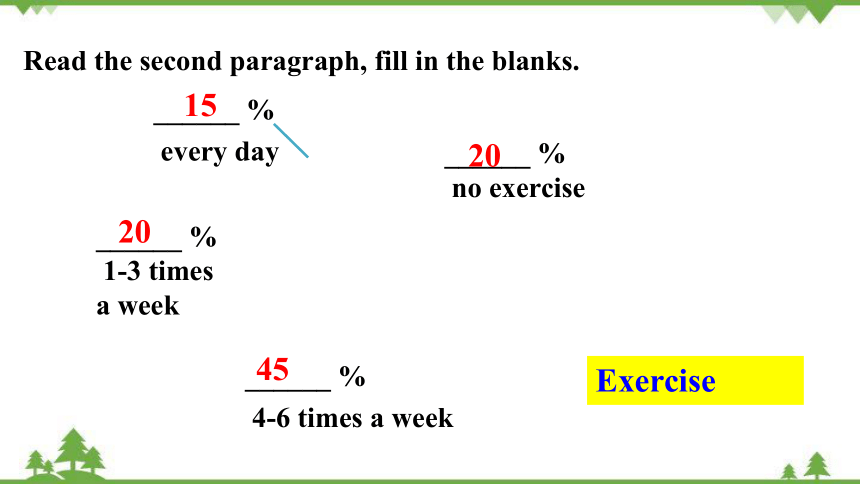
文档简介
(共45张PPT)
Unit 2 How often do you exercise
R 八年级上册
Section B 第4课时
Jim/once a week
Li Ming / twice a week
Tony/3 or 4 times a week
Bob/every day
Lily/hardly ever
Peter/never
Review
New Words
单词填写
1.头脑;心智(n.) _________
2.尽管;虽然;即使(conj.) _________
3.联网的;在线的(adj. &adv.) _________
4.以;凭借;穿过( prep.) _________
5.write(v .)写 → _________ 作家;作者( n. )
6.消失;灭亡;死亡( v.) ________
mind
although
online
through
writer
die
短语搭配
junk food 例如;像……一样
such as 垃圾食品
less than ……的答案
good /bad habits 少于
the answer to 好/坏习惯
Lead-in
How can we be healthy
Exercise often and eat healthy food.
Could you tell us some healthy food
Well. Fruit, vegetables, milk, rice and meat.
2a
Rank these activities according to how often you think your classmates do them (1=most often, 6= least often).
watch TV
go to the movies
play computer games
exercise or play sports
use the Internet
go camping in the country
1
2
3
4
5
6
Do a survey
What do you do in your free time Doing exercise, use of the Internet or watching TV
What activities do you think is healthy for the mind and the body
2b
Read the article and complete the pie chart on the next page.
Read the passage quickly and find the answer to the questions below.
1. How many kinds of free time activities are mentioned
(提到)in the passage
__________________________________
2. What is the best way to relax
__________________________________
Three.
The best way to relax is through exercise.
What Do No.5 High School Students Do in Their Free Time?
Last month we asked our students about their free time activities. Our questions were about exercise, use of the Internet and watching TV. Here are the results.
We found that only fifteen percent of our students exercise every day. Forty-five percent exercise four to six times a week. Twenty percent exercise only one to three times a week. And twenty percent do not exercise at all!
We all know that many students often go online, but we were surprised that ninety percent of them use the Internet every day. The other ten percent use it at least three or four times a week. Most students use it for fun and not for homework.
free time activities 业余活动
fifteen percent百分之十五
at least至少
use …for fun 用……来娱乐
The answers to our questions about watching television were also interesting. Only two percent of the students watch TV one to three times a week. Thirteen percent watch TV four to six times a week. And eighty-five percent watch TV every day! Although many students like to watch sports, game shows are the most popular.
It is good to relax by using the Internet or watching game shows, but we think the best way to relax is through exercise. It is healthy for the mind and the body. Exercise such as playing sports is fun, and you can spend time with your friends and family as you play together. And remember, “Old habits die hard.”So start exercising before it’s too late!
the answers to ……的答案
although 虽然,尽管
healthy 健康的
such as 例如
old habits die hard旧习难改
Read the second paragraph, fill in the blanks.
______ %
every day
Exercise
______ %
4-6 times a week
______ %
1-3 times
a week
______ %
no exercise
20
15
20
45
______ %
3 or 4 times a week
10
______ %
every day
Read the third paragraph, fill in the blanks.
Use the Internet
90
______ %
4-6 times a week
Watch TV
______ %
1-3 times a week
______ %
every day
85
13
2
Read the forth paragraph, fill in the blanks.
Complete the pie charts.
15
85
90
20
20
2
13
10
45
Language points
1. Last month we asked our students about their free time activities. 上个月我们询问了学生们他们的业余活动情况。
ask sb. about sth.意为“问某人关于某事的情况;就某事询问某人”。?
e.g. She asked him about his health.
她询问了他的健康状况。?
I ask my teacher about today’s homework.
我向我的老师询问今天的家庭作业。
(1) ask for意为“要;要求;请求”,其宾语是物,表
示“(向某人)要……”。
ask sb. for sth.意为“向某人要某物”。?
e.g. You can ask policeman for help .
你可以向警察求助。?
(2) ask for a leave意为“请假”。?
e.g.你能帮我请个假吗?
Could you help me ask for a leave
拓展
中考对接
(贵州安顺中考)John often asks his teacher ______ help.?
A . to B . with?
C . for D . on
C
2. Here are the results. 这是(调查)结果。
(1)该句是here引导的倒装句。
将here置于句首是为了引起人们的注意。
当here置于句首时,如果主语是代词,谓语应在主语之后;如果主语是名词,谓语应置于其前。且谓语动词的数随着主语的人称和数的变化而变化。
e.g. Here she(代词)comes(第三人称单数).
她来了。?
Here are(复数)some bananas(名词).
这里有一些香蕉。
拓展:引导倒装句的副词还有there,now,then等,它们置于句首时,谓语动词常用be,come,go,lie等表示位置移动或状态的动词。
e.g. 那时总裁来了。
Then came the chairman.
(2) result作名词,意为“结果”。
the result of… ……的结果, of后常跟名词(短语);
as a result 结果;因此
as a result of… 因为,由于……?
e.g.你考试的结果如何??
What's the result of your exam
交通十分拥挤,因此我迟到了。
The traffic was very heavy and as a result I was late.
中考对接
(山东威海中考)There _______ a great concert in the theater next Saturday evening. ?
A . will be B . will have?
C . has D . is going to have
A
3.And twenty percent do not exercise at all!
并且20%的学生根本不锻炼!
not…at all意为“一点儿也不;根本不”。?
e.g. Tom doesn’t like to learn math at all.
汤姆根本不喜欢学习数学。
I don’t know about it at all.
我一点儿也不知道那件事。
not at all用法小结:?
(1)用来回答感谢,意为“不用谢;不客气”。?
e.g. —Thank you very much. 多谢你了。
—Not at all. 不客气。
(2)用来回答带有感谢性质的客套话,意为“没什么”。
e.g. —You are very kind. 你真好。 —Not at all. 没什么。
(3)用来回答道歉,意为“没关系”。?
e.g. —Sorry I'm late. 对不起,我迟到了。?
—Oh, not at all, do come in. 噢,没关系,请进来。
(4)用来表示否定,意为“一点儿也不;完全不”。
e.g.—Is it difficult to study English 英语难学吗??
—Not at all. 一点儿不难。
4.We all know that many students often go online, but we were surprised that ninety percent of them use the Internet every day.我们都知道很多学生经常上网,但令我们吃惊的是,有90%的学生每天都用互联网。
surprised作形容词,意为“感到惊讶的”。
常用结构:be surprised at sth.“对……感到惊讶”;
be surprised to do sth.“做……而感到惊讶”;
be surprised + that从句,“因……而惊讶”。?
e.g. 你对这个结果感到惊讶吗?
Are you surprised at the result
? 他们对见到他感到很惊讶。
They were surprised to see him.
? 我吃惊的是他及时来到了这儿。
I’m surprised that he came here in time.
surprised VS surprising
(1)surprised意为“感到吃惊的”,主语是人。
例句:I was surprised when I heard the news.
听到这个消息时,我感到惊讶。
(2)surprising意为“使人惊奇的”,主语是事物。
例句:Your success is surprising.
你的成功令人吃惊。
中考对接
(山东东营中考)The fans were________ to know the death of their favorite singing star Whitney Huston.
A . glad B . angry?
C . excited D . surprised
D
5.It is good to relax by using the Internet or watching game shows, but we think the best way to relax is through exercise. 上网或看游戏类节目是很好的放松方式,但我们认为最好的方式是通过锻炼来放松。
It’s +adj.+to do sth. 意为“做某事是……的”。
it是形式主语,真正的主语是后面的动词不定式。
e.g. It’s dangerous to swim in the river.
在河里游泳是危险的。
It’s very important to learn English well.
学好英语很重要。
在It’s +adj.+for/of sb. to do sth.中,
若形容词为important, useful, necessary , hard , easy等表示事物性质、状态或特征的词,用It’s + adj.+for sb. to do sth.;
若形容词为kind, clever , wise等表示性格特点的形容词,用It’s + adj.+ of sb. to do sth.。?
e.g. 对你来说,努力学习很重要。
It’s important for you to study hard.
? 你能帮助我真是太好心了。
It’s kind of you to help me.
2c
Read the article again and answer the questions.
Things Jane did or saw
Did she like it
(Yes/No)
Why or why not
1. How many percent of the students do not exercise at all
____________________________________________________
2. How many percent of the students use the Internet every day
____________________________________________________
3. How often do most students watch TV What do they usually watch
___________________________________________________
___________________________________________________
Ninety percent of the students.
Twenty percent of the students.
Most students watch TV every day.
They usually watch game shows.
4. What does the writer think is the best way to relax Why
_________________________________________________
_________________________________________________
_________________________________________________
5. Do you think the students in No. 5 are healthy
_________________________________________________
Why or why not
_________________________________________________
_________________________________________________
Exercise. Because it’s healthy for the mind and the body, and you can spend time with your friends and family as you play together.
No, I don’t think so.
Because most students use Internet or watch TV on their free time. They don’t like exercising. It’s unhealthy.
2d
According to the article and the pie charts, write sentences with the percentages using always, usually or sometimes .
1. 90%:___________________________________________
2. 85%: __________________________________________
3. 45%: __________________________________________
Eighty-five percent of the students always watch TV.
Ninety percent of the students always use the Internet.
Forty-five percent of the students usually exercise.
4. 10%: _______________________________________________
5. 13%:________________________________________________ 6. 2%: ________________________________________________
Ten percent of the students sometimes use the Internet.
Thirteen percent of the students usually watch TV.
Two percent of the students sometimes watch TV.
2e
Choose one of these free time activities or think of your own. Then ask your classmates how often they do this activity and make a pie chart.
play computer games
read books
go shopping
draw pictures
play sports
play computer games read books
go shopping draw pictures play sports
How often do you... Names of classmates
1-3 times a week
4-6 times a week
every day
1-3 times a week.
How often do you play sports
Every day.
How often do you read books
______ %
4-6 times a week
Play sports
______ %
1-3 times a week
______ %
every day
50
25
25
汉译英
1. —你多久喝一次牛奶?
—我每天都喝。
2. 我妈妈想让我喝牛奶。她说它对我的健康有益。
—How often do you drink milk
—I drink milk every day.
My mother wants me to drink milk. She says it’s good for my health.
3. 多读书对我们有好处。
It’s good for us to do more reading.
4. 老师不想让我们吃汉堡包。
The teacher doesn’t want us to eat hamburgers.
5. 大声朗读对提高你的英语有好处。
Reading aloud is good for improving your English.
选词填空
often never exercise health
do one’s homework
— How do you usually keep healthy
— I ________ every morning.
2. I _______ go to visit my grandma, about four times a week.
3. Don’t eat too much every meal. It is bad for your ________.
4. — What do you usually do on weekends
— I often ________________ at home.
exercise
often
health
do my homework
Unit 2 How often do you exercise
R 八年级上册
Section B 第4课时
Jim/once a week
Li Ming / twice a week
Tony/3 or 4 times a week
Bob/every day
Lily/hardly ever
Peter/never
Review
New Words
单词填写
1.头脑;心智(n.) _________
2.尽管;虽然;即使(conj.) _________
3.联网的;在线的(adj. &adv.) _________
4.以;凭借;穿过( prep.) _________
5.write(v .)写 → _________ 作家;作者( n. )
6.消失;灭亡;死亡( v.) ________
mind
although
online
through
writer
die
短语搭配
junk food 例如;像……一样
such as 垃圾食品
less than ……的答案
good /bad habits 少于
the answer to 好/坏习惯
Lead-in
How can we be healthy
Exercise often and eat healthy food.
Could you tell us some healthy food
Well. Fruit, vegetables, milk, rice and meat.
2a
Rank these activities according to how often you think your classmates do them (1=most often, 6= least often).
watch TV
go to the movies
play computer games
exercise or play sports
use the Internet
go camping in the country
1
2
3
4
5
6
Do a survey
What do you do in your free time Doing exercise, use of the Internet or watching TV
What activities do you think is healthy for the mind and the body
2b
Read the article and complete the pie chart on the next page.
Read the passage quickly and find the answer to the questions below.
1. How many kinds of free time activities are mentioned
(提到)in the passage
__________________________________
2. What is the best way to relax
__________________________________
Three.
The best way to relax is through exercise.
What Do No.5 High School Students Do in Their Free Time?
Last month we asked our students about their free time activities. Our questions were about exercise, use of the Internet and watching TV. Here are the results.
We found that only fifteen percent of our students exercise every day. Forty-five percent exercise four to six times a week. Twenty percent exercise only one to three times a week. And twenty percent do not exercise at all!
We all know that many students often go online, but we were surprised that ninety percent of them use the Internet every day. The other ten percent use it at least three or four times a week. Most students use it for fun and not for homework.
free time activities 业余活动
fifteen percent百分之十五
at least至少
use …for fun 用……来娱乐
The answers to our questions about watching television were also interesting. Only two percent of the students watch TV one to three times a week. Thirteen percent watch TV four to six times a week. And eighty-five percent watch TV every day! Although many students like to watch sports, game shows are the most popular.
It is good to relax by using the Internet or watching game shows, but we think the best way to relax is through exercise. It is healthy for the mind and the body. Exercise such as playing sports is fun, and you can spend time with your friends and family as you play together. And remember, “Old habits die hard.”So start exercising before it’s too late!
the answers to ……的答案
although 虽然,尽管
healthy 健康的
such as 例如
old habits die hard旧习难改
Read the second paragraph, fill in the blanks.
______ %
every day
Exercise
______ %
4-6 times a week
______ %
1-3 times
a week
______ %
no exercise
20
15
20
45
______ %
3 or 4 times a week
10
______ %
every day
Read the third paragraph, fill in the blanks.
Use the Internet
90
______ %
4-6 times a week
Watch TV
______ %
1-3 times a week
______ %
every day
85
13
2
Read the forth paragraph, fill in the blanks.
Complete the pie charts.
15
85
90
20
20
2
13
10
45
Language points
1. Last month we asked our students about their free time activities. 上个月我们询问了学生们他们的业余活动情况。
ask sb. about sth.意为“问某人关于某事的情况;就某事询问某人”。?
e.g. She asked him about his health.
她询问了他的健康状况。?
I ask my teacher about today’s homework.
我向我的老师询问今天的家庭作业。
(1) ask for意为“要;要求;请求”,其宾语是物,表
示“(向某人)要……”。
ask sb. for sth.意为“向某人要某物”。?
e.g. You can ask policeman for help .
你可以向警察求助。?
(2) ask for a leave意为“请假”。?
e.g.你能帮我请个假吗?
Could you help me ask for a leave
拓展
中考对接
(贵州安顺中考)John often asks his teacher ______ help.?
A . to B . with?
C . for D . on
C
2. Here are the results. 这是(调查)结果。
(1)该句是here引导的倒装句。
将here置于句首是为了引起人们的注意。
当here置于句首时,如果主语是代词,谓语应在主语之后;如果主语是名词,谓语应置于其前。且谓语动词的数随着主语的人称和数的变化而变化。
e.g. Here she(代词)comes(第三人称单数).
她来了。?
Here are(复数)some bananas(名词).
这里有一些香蕉。
拓展:引导倒装句的副词还有there,now,then等,它们置于句首时,谓语动词常用be,come,go,lie等表示位置移动或状态的动词。
e.g. 那时总裁来了。
Then came the chairman.
(2) result作名词,意为“结果”。
the result of… ……的结果, of后常跟名词(短语);
as a result 结果;因此
as a result of… 因为,由于……?
e.g.你考试的结果如何??
What's the result of your exam
交通十分拥挤,因此我迟到了。
The traffic was very heavy and as a result I was late.
中考对接
(山东威海中考)There _______ a great concert in the theater next Saturday evening. ?
A . will be B . will have?
C . has D . is going to have
A
3.And twenty percent do not exercise at all!
并且20%的学生根本不锻炼!
not…at all意为“一点儿也不;根本不”。?
e.g. Tom doesn’t like to learn math at all.
汤姆根本不喜欢学习数学。
I don’t know about it at all.
我一点儿也不知道那件事。
not at all用法小结:?
(1)用来回答感谢,意为“不用谢;不客气”。?
e.g. —Thank you very much. 多谢你了。
—Not at all. 不客气。
(2)用来回答带有感谢性质的客套话,意为“没什么”。
e.g. —You are very kind. 你真好。 —Not at all. 没什么。
(3)用来回答道歉,意为“没关系”。?
e.g. —Sorry I'm late. 对不起,我迟到了。?
—Oh, not at all, do come in. 噢,没关系,请进来。
(4)用来表示否定,意为“一点儿也不;完全不”。
e.g.—Is it difficult to study English 英语难学吗??
—Not at all. 一点儿不难。
4.We all know that many students often go online, but we were surprised that ninety percent of them use the Internet every day.我们都知道很多学生经常上网,但令我们吃惊的是,有90%的学生每天都用互联网。
surprised作形容词,意为“感到惊讶的”。
常用结构:be surprised at sth.“对……感到惊讶”;
be surprised to do sth.“做……而感到惊讶”;
be surprised + that从句,“因……而惊讶”。?
e.g. 你对这个结果感到惊讶吗?
Are you surprised at the result
? 他们对见到他感到很惊讶。
They were surprised to see him.
? 我吃惊的是他及时来到了这儿。
I’m surprised that he came here in time.
surprised VS surprising
(1)surprised意为“感到吃惊的”,主语是人。
例句:I was surprised when I heard the news.
听到这个消息时,我感到惊讶。
(2)surprising意为“使人惊奇的”,主语是事物。
例句:Your success is surprising.
你的成功令人吃惊。
中考对接
(山东东营中考)The fans were________ to know the death of their favorite singing star Whitney Huston.
A . glad B . angry?
C . excited D . surprised
D
5.It is good to relax by using the Internet or watching game shows, but we think the best way to relax is through exercise. 上网或看游戏类节目是很好的放松方式,但我们认为最好的方式是通过锻炼来放松。
It’s +adj.+to do sth. 意为“做某事是……的”。
it是形式主语,真正的主语是后面的动词不定式。
e.g. It’s dangerous to swim in the river.
在河里游泳是危险的。
It’s very important to learn English well.
学好英语很重要。
在It’s +adj.+for/of sb. to do sth.中,
若形容词为important, useful, necessary , hard , easy等表示事物性质、状态或特征的词,用It’s + adj.+for sb. to do sth.;
若形容词为kind, clever , wise等表示性格特点的形容词,用It’s + adj.+ of sb. to do sth.。?
e.g. 对你来说,努力学习很重要。
It’s important for you to study hard.
? 你能帮助我真是太好心了。
It’s kind of you to help me.
2c
Read the article again and answer the questions.
Things Jane did or saw
Did she like it
(Yes/No)
Why or why not
1. How many percent of the students do not exercise at all
____________________________________________________
2. How many percent of the students use the Internet every day
____________________________________________________
3. How often do most students watch TV What do they usually watch
___________________________________________________
___________________________________________________
Ninety percent of the students.
Twenty percent of the students.
Most students watch TV every day.
They usually watch game shows.
4. What does the writer think is the best way to relax Why
_________________________________________________
_________________________________________________
_________________________________________________
5. Do you think the students in No. 5 are healthy
_________________________________________________
Why or why not
_________________________________________________
_________________________________________________
Exercise. Because it’s healthy for the mind and the body, and you can spend time with your friends and family as you play together.
No, I don’t think so.
Because most students use Internet or watch TV on their free time. They don’t like exercising. It’s unhealthy.
2d
According to the article and the pie charts, write sentences with the percentages using always, usually or sometimes .
1. 90%:___________________________________________
2. 85%: __________________________________________
3. 45%: __________________________________________
Eighty-five percent of the students always watch TV.
Ninety percent of the students always use the Internet.
Forty-five percent of the students usually exercise.
4. 10%: _______________________________________________
5. 13%:________________________________________________ 6. 2%: ________________________________________________
Ten percent of the students sometimes use the Internet.
Thirteen percent of the students usually watch TV.
Two percent of the students sometimes watch TV.
2e
Choose one of these free time activities or think of your own. Then ask your classmates how often they do this activity and make a pie chart.
play computer games
read books
go shopping
draw pictures
play sports
play computer games read books
go shopping draw pictures play sports
How often do you... Names of classmates
1-3 times a week
4-6 times a week
every day
1-3 times a week.
How often do you play sports
Every day.
How often do you read books
______ %
4-6 times a week
Play sports
______ %
1-3 times a week
______ %
every day
50
25
25
汉译英
1. —你多久喝一次牛奶?
—我每天都喝。
2. 我妈妈想让我喝牛奶。她说它对我的健康有益。
—How often do you drink milk
—I drink milk every day.
My mother wants me to drink milk. She says it’s good for my health.
3. 多读书对我们有好处。
It’s good for us to do more reading.
4. 老师不想让我们吃汉堡包。
The teacher doesn’t want us to eat hamburgers.
5. 大声朗读对提高你的英语有好处。
Reading aloud is good for improving your English.
选词填空
often never exercise health
do one’s homework
— How do you usually keep healthy
— I ________ every morning.
2. I _______ go to visit my grandma, about four times a week.
3. Don’t eat too much every meal. It is bad for your ________.
4. — What do you usually do on weekends
— I often ________________ at home.
exercise
often
health
do my homework
同课章节目录
- Unit 1 Where did you go on vacation?
- Section A
- Section B
- Unit 2 How often do you exercise?
- Section A
- Section B
- Unit 3 I'm more outgoing than my sister.
- Section A
- Section B
- Unit 4 What's the best movie theater?
- Section A
- Section B
- Unit 5 Do you want to watch a game show?
- Section A
- Section B
- Unit 6 I'm going to study computer science.
- Section A
- Section B
- Unit 7 Will people have robots?
- Section A
- Section B
- Unit 8 How do you make a banana milk shake?
- Section A
- Section B
- Unit 9 Can you come to my party?
- Section A
- Section B
- Unit 10 If you go to the party, you'll have a grea
- Section A
- Section B
